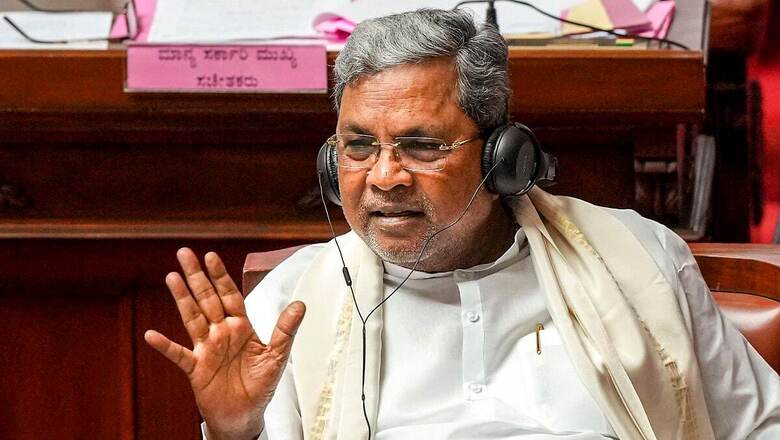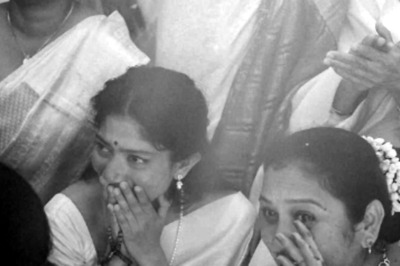
views
In a setback for Siddaramaih on Tuesday, the Karnataka High Court dismissed the chief minister’s petition challenging the legality of Governor Thaawarchand Gehlot’s approval for an investigation against him in the Mysuru Urban Development Authority (MUDA) site allotment case.
The court, while noting that the order does not suffer from non-application of mind by the Governor, said the latter could make an independent decision.
The MUDA case pertains to allegations that compensatory sites were allotted to Siddaramaiah’s wife BM Parvathi in an upmarket area in Mysuru, which had higher property value as compared to the location of her land which had been “acquired” by the authority.
WHAT IS THE MUDA SCAM?
Under MUDA’s 50:50 scheme, land owners were promised 50 per cent of the developed site per acre that they give up. This works out to about 9 developed plots of 30’x40’ dimension and they will be at liberty to sell it to anyone at the prevailing market rate.
The scheme was first introduced in 2009, but scrapped in 2020 by the BJP government. However, MUDA still continued with the scheme without seeking permission from the then BJP government.
The distribution of sites continued despite two government orders in the last six months directing MUDA to cancel the allotment of sites to beneficiaries under the 50:50 scheme until clear guidelines were issued. However, the allotment did not stop.
An inquiry on July 1 said there was suspicion that rather than providing the sites to eligible beneficiaries, there are complaints that they were allotted to influential people and real estate agents.
Urban Development Minister Byrati Suresh has already transferred four officers, including MUDA Commissioner Dinesh Kumar.
TRACING THE ORIGINS OF THE CASE
In 1959, the land belonged to one Ninga, son of Javara, in Kesere Village of Karnataka’s Mysore district.
Ninga’s rights, however, were relinquished in 1968. On October 29, 1968, his eldest son Mallaiah and third son Devaraju surrendered their rights over 3 acres and 16 guntas of land to Ninga’s second son, Mylaraiah, after receiving Rs 300. Mylaraiah became the sole owner of the land.
Cut to September 1992, a preliminary notification was issued to acquire land measuring 3.16 acres of Ninga’s land to form the third phase of the Devanur Layout. In February 1998, the final notification was issued to acquire 3.16 acres of land.
In May 1998, the land was denotified, removing it from the acquisition process.
In 2001, the denotified land was used to form the third phase of the Devanur Layout, and sites were allotted. In November 2003, the land was restored to the original owner.
In August 2004, Siddaramaiah’s brother-in-law, Mallikarjunaswamy, purchased 3.16 acres of the ‘agricultural’ land.
A year later, in July 2005, land purchased by Mallikarjunaswamy was converted for non-agricultural use.
In October 2010, Mallikarjunaswamy gifted the land to his sister Parvathi, Siddaramaiah’s wife. Four years later, in June 2014, Parvathi sought compensation for her land being used by MUDA.
In December 2017, MUDA admitted using denotified land for the layout and decided to grant alternative sites to Parvathi. In November 2020, MUDA agreed to award alternative sites on a 50:50 basis, giving Parvathi half the land as developed plots.
In October 2021, Parvathi again petitioned MUDA for alternative sites as compensation and she was allotted 14 plots in Vijayanagar 3rd phase in January 2022.
In October 2023, the government scrapped the 50:50 scheme. Following this, on July 4, 2024, Siddaramaiah sought compensation of Rs 62 crore, claiming his land was usurped.
On July 14 the same year, the government set up a one-man inquiry commission to investigate alleged illegalities. On July 24, Speaker UT Khader refused permission to discuss the MUDA ‘scam’ in the Assembly and two days later, the Governor issued a show-cause notice to Siddaramaiah after a petition from social activist TJ Abraham.
On August 1, the cabinet urged the Governor to withdraw the show-cause notice to the chief minister. Two days later, Siddaramaiah responded to the notice, denying the allegations.
Between August 3 and 10, opposition BJP-JD(S) organised a foot march to Mysuru. On August 17, the Governor granted sanction for an investigation against Siddaramaiah.
Two days later, on August 19, Siddaramaiah filed a petition in the High Court challenging the Governor’s sanction for prosecution under Section 17A of the Prevention of Corruption Act, 1988, and Section 218 of the Bharatiya Nyaya Suraksha Sanhita, 2023.
After subsequent adjournments, on September 24, Tuesday, the Karnataka High Court dismissed the CM’s plea.
(With PTI inputs)




















Comments
0 comment